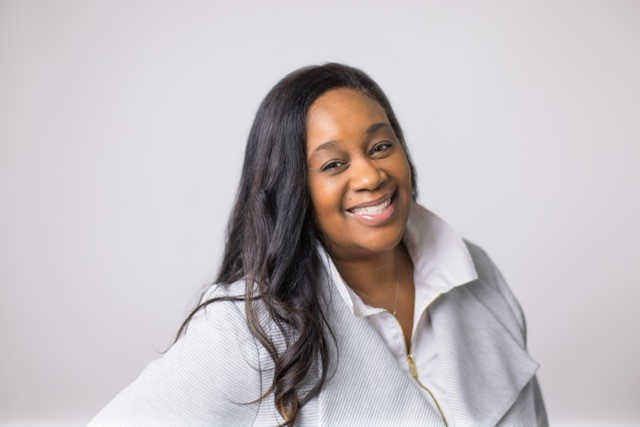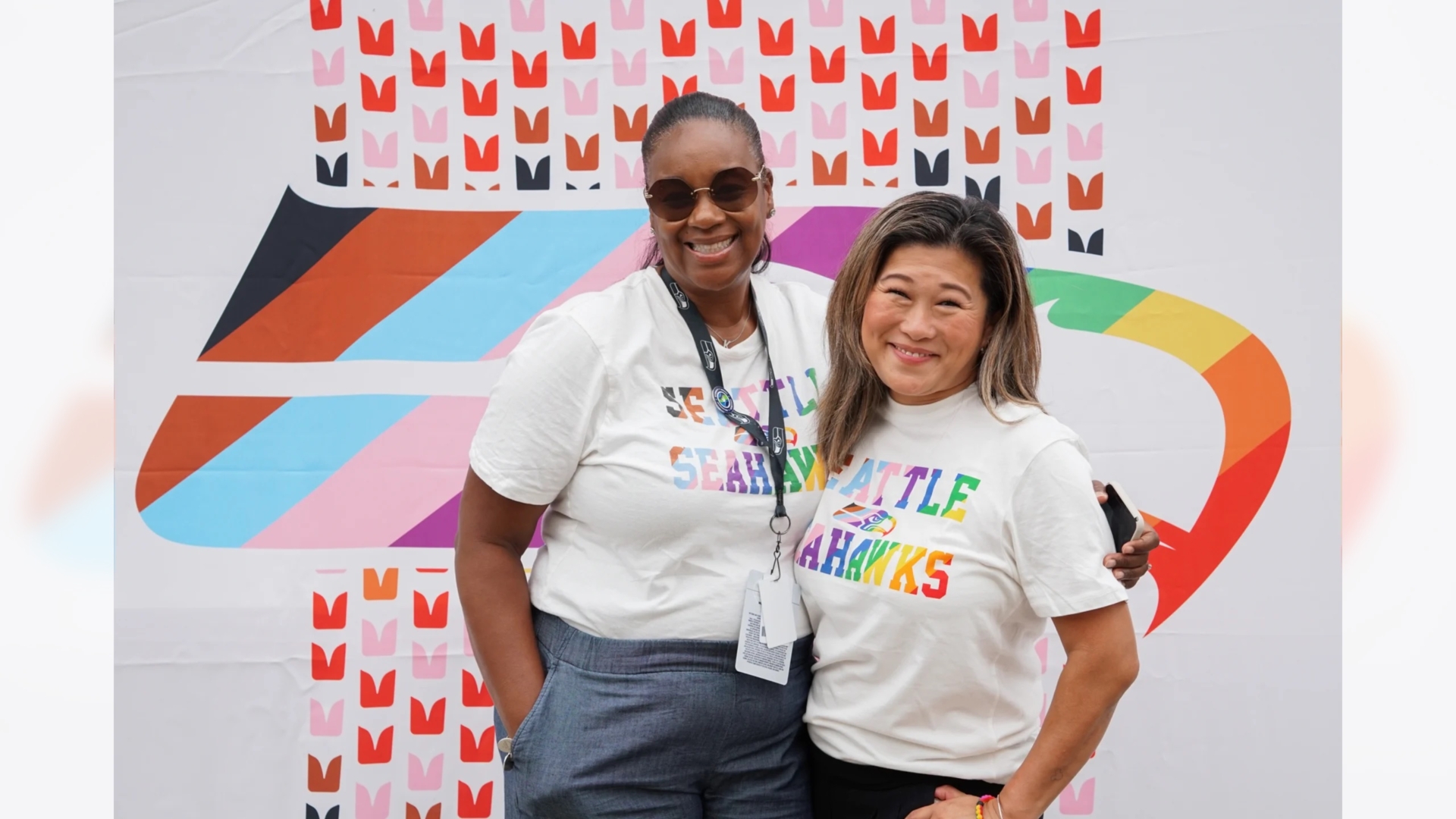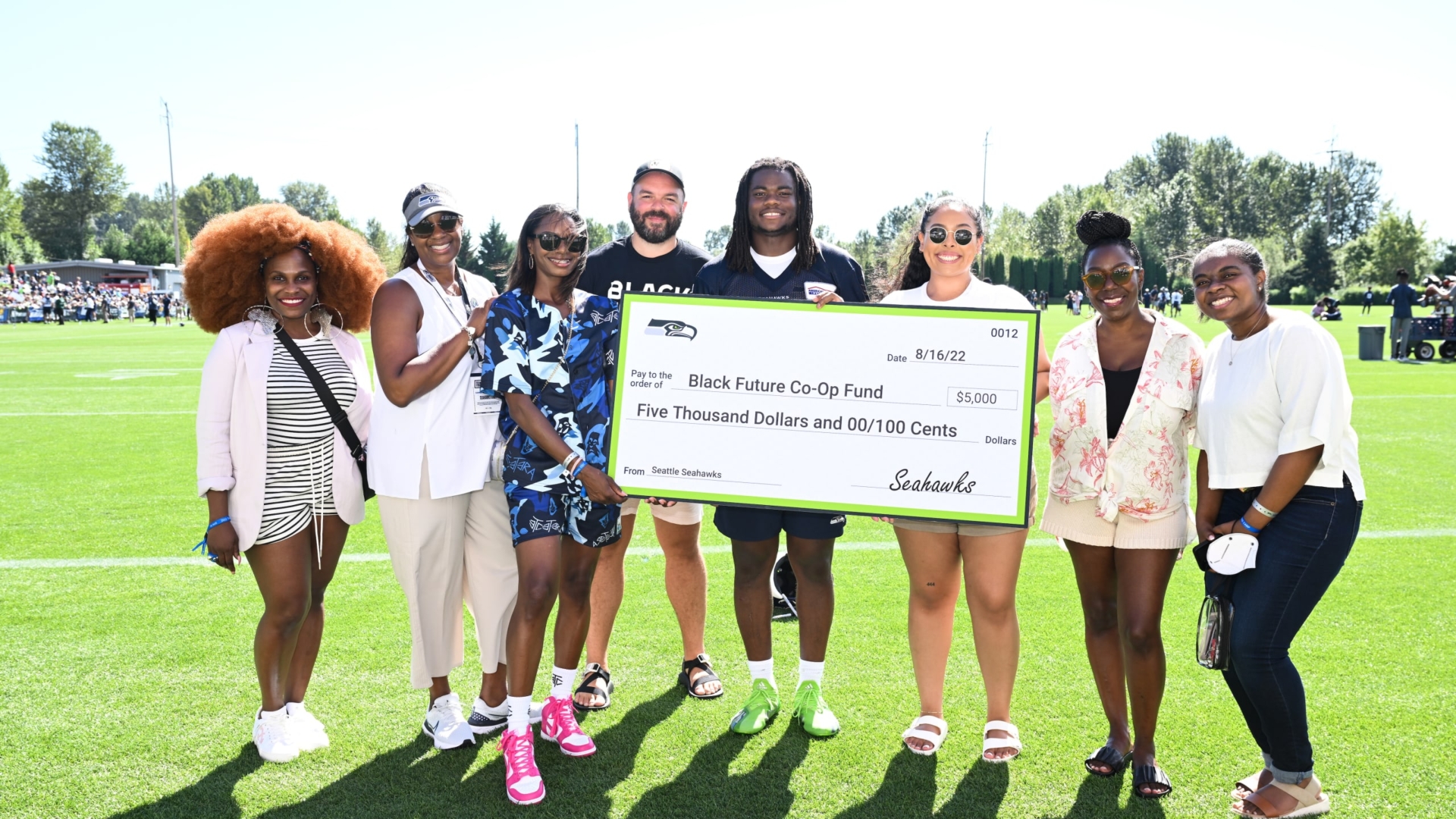Alumna Makes History as Vice President of Diversity, Equity, and Inclusion for Seattle Seahawks

Having already worked for some of the biggest companies in the financial, technology, and travel industries, Karen Wilkins-Mickey was happy with her career trajectory. She had led diversity and inclusion efforts at Washington Mutual, Microsoft, and Expedia, and by September 2020, she could envision herself retiring from Alaska Airlines, where she’d been doing meaningful work for several years.
“We were in the middle of the pandemic and our war on social justice and the social injustices that were happening,” she said. “I needed to be in that role at Alaska Airlines, and I wasn’t thinking about leaving—but then an opportunity presented itself.”
The National Football League’s (NFL) Seattle Seahawks franchise approached Wilkins-Mickey (Communications, ’92) with interest in adding her to its staff as its vice president of diversity, equity, and inclusion (DEI). The potential move was appealing—it would be the league’s first such hire at the team level—but because this kind of work is so often buried in some organizations, she had a few hopes for her next role.
“I didn’t want another role that didn’t report directly at the top,” she said. “I had to have access.”
In January 2021, Wilkins-Mickey made league history in accepting the new role. Focusing on fostering inclusive culture and community within the organization, among its devoted fanbase, and around the entire league, the Seahawks are setting the pace for DEI events, public outreach, and awareness not only in professional football but on a corporate scale.
The topic of race in professional sports has been under scrutiny in recent years—particularly through the lens of inequity of its athletes, staff, and executives—and the NFL is not immune. For example, in 2021, while 70.7 percent of NFL players were people of color, only five of its 32 head coaches were people of color (15.6 percent). Additionally, three general managers are Black and none of the league’s majority owners are Black. With these numbers improving only marginally over the years, Wilkins-Mickey knew her role with the Seahawks was vital.
One of her first priorities in her new role was to celebrate and acknowledge the many cultures throughout the organization—and that meant more than just the players on the field.
“Players come and go, but the ones who are steady are the people in the back office, in the kitchen, and at the stadium,” she said. “I wanted to get to know one teammate at a time—and I did that.”
During her first year with the Seahawks, she focused on listening to the staff behind the scenes and whose stories largely go unheard. By amplifying voices of the marginalized communities within the organization, she continues to explore ways to celebrate cultural differences through internal monthly conversations called “Hear our Stories” and a monthly DEI newsletter.

“We want to show who the person is and not just what their job title, name, rank, and serial number are,” she explained. “It’s about, ‘Who is this employee? What’s their identity? How do we celebrate them? What does this culture mean for them?’ I help to celebrate what’s different about our employees and what they bring to the organization—that fulfills me.”
Additionally, Wilkins-Mickey has helped guide the franchise’s community commitment to racial equity and justice by investing in advancing economic stability, fostering an inclusive culture, and combatting racism through education and awareness. One of the ways in accomplishing this is tying DEI initiatives in with community initiatives.
Recent efforts this preseason include the Seahawks donating $5,000 to the Black Future Co-Op Fund for Black Philanthropy Month, hosting its first ever Pride Night Game, and holding a public land acknowledgement—Lumen Field, the Seahawks home stadium, sits on the ancestral lands of the Salish, Duwamish, and the Muckleshoot Indigenous people.
“One of the things that’s really important with this work is you don’t want to be performative,” she said. “I don’t want to do Pride in just June—that’s why we’re doing it in August. I don’t want to wait until February for Black History Month—that’s why we support Black Philanthropy Month in August.”
Wilkins-Mickey did not grow up an avid football fan. Born and bred in the Bronx, New York, hers was a basketball-crazed family that preferred watching professional and college hoops over gridiron action. A self-described “leisurely football watcher,” her exposure to the sport was largely by tuning in to the Super Bowl and its halftime show.
But, when the Seahawks called, the opportunity to take the lead on a stage as large as the NFL with a forward-thinking and action-oriented franchise was too good to pass up.
“The Seahawks had a great platform and foundation already, I just helped to connect some people and align it so that it had more impact,” she said. “I feel a sense of responsibility to so many who have paved the way for me to be where I am today. I don’t take it lightly, and I work hard every day to be the best me that I can possibly be.”
Wilkins-Mickey’s drive to maximize her vast potential was cultivated while at Chico State—but it wasn’t always easy. After starting at a private college in Connecticut, she and her family quickly realized that continuing there was not economically feasible. Even after being accepted to all State University of New York schools, she explored out-of-state higher education institutions and discovered the more-affordable CSU system and Chico State.

“I thought that’d be really cool to go somewhere completely different from where I grew up,” she said. “I like the fact that Chico State was so different from back East and that it was such a big part of the town. I loved the college town experience.”
In moving from New York to Chico, though, she quickly realized she stood out as the Black girl with the heavy East Coast accent. This only strengthened her resolve.
“I didn’t realize how much of a culture shock and shift it would be for me to go from New York, where the mosaic of culture was rich and plentiful, to a place where I was different and ‘other’ and ‘only,’” she recalled. “I’m extremely adaptable, it was just something I needed to adjust to.”
Often the only Black student in her classes, Wilkins-Mickey said she assimilated by tempering her New York accent. But since she couldn’t change the color of her skin—nor did she want to—the proud New Yorker embraced the chance to teach her peers.
“It was, ‘I’m Karen Wilkins from New York. Let me educate you about what that means. Let me tell you why the word “colored” is for crayons and not for people,’” she said. “Chico State is part of my identity, and I think that experience helped prepare me for the role I play today and have played for almost 20 years. My lived experiences and passion drove me here.”
While confidence has always been one of her strong suits, after years of working in the DEI field it was a lesson she learned as part of McKinsey’s Black Executive Leadership Program’s first cohort—which she was attending simultaneously as the Seahawks courted her—that ignited her interest in the organization.
“McKinsey taught me that I have a lot to offer,” she said. “They taught me that I have to feel comfortable asking for what it is that I want and to go after things that are better for me.”
Looking back, Wilkins-Mickey notes that her experiences at Chico State, both adjusting to her new surroundings and the quality of the education that became the foundation for her career, are something she is grateful for.
“At Chico State, I was able to get an affordable education, and a very good one,” she said. “It wasn’t easy, because I was so far away, but I had such a great experience.”


